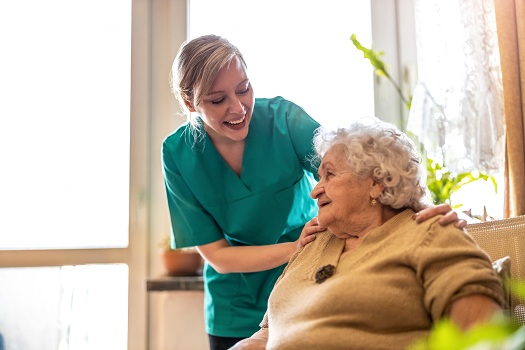One of the most challenging aspects of Alzheimer’s disease is how it impairs communication skills. Seniors with Alzheimer’s may lose the language skills, memory, and cognitive function required for conversations, yet they may get stressed and upset when they cannot understand others or communicate their needs. Caregivers may need to modify their communication methods to better discuss things with their senior loved ones. The following tips can help you communicate better with a loved one who has Alzheimer’s disease.
Be Patient
Be aware that communicating with a senior with Alzheimer’s will take more time than the average conversation. It may take your parent longer to think of the right word or decide how to state a sentence. Trying to rush or interrupt your loved one may make him or her feel pressured and frustrated. Remain quiet, and wait patiently for your loved one to respond.
Professional caregivers with training and expertise in Alzheimer’s care can often identify the sources of communication issues and respond effectively and compassionately. Aging adults with Alzheimer’s disease can benefit from receiving professional Alzheimer’s care. Barrie seniors need regular mental stimulation when managing memory-related conditions, and a reliable in-home caregiver who has extensive training in Alzheimer’s care can be a great asset.
Reduce Distractions
Seniors in the middle stages of Alzheimer’s often get easily distracted, and they may have difficulty conversing when their brains are busy trying to process everything in the environment. A quiet, familiar space with few distractions is often the best place to discuss things. Keep your loved one’s attention by maintaining eye contact, and ask a single question or make one statement at a time.
Try Alternative Communication Methods
Alzheimer’s affects each part of the brain differently, so some seniors may remain fluent in one conversational method while facing difficulty with another. In the early stages, some seniors find it easier to communicate by writing or making phone calls instead of engaging in direct conversations. In Alzheimer’s later stages, seniors often communicate through facial gestures and hand movements. Some find it easier to use communication boards that let them point at the words or images they wish to express.
A trained caregiver with experience in caring for seniors with Alzheimer’s can be a fantastic resource for family members. Families looking for top-rated senior home care providers can reach out to Home Care Assistance. From respite care to specialized Alzheimer’s, dementia, stroke, and Parkinson’s care, there are many ways we can make life easier for seniors and their loved ones.
Say Things as Clearly & Simply as Possible
When helping your loved one with daily tasks, provide basic step-by-step instructions. Avoid complicated words or slang, and speak in shorter sentences. Asking yes-or-no questions instead of making open-ended inquiries may help your loved one focus on communication.
Avoid Contradicting Your Loved One
Seniors with Alzheimer’s are often stubborn, and even those who aren’t obstinate tend to get distressed when corrected. You may find it easier to communicate with your loved one when you don’t spend all your time reminding him or her of the right time frames, names, or words. Listen for the intent of what is being said instead of trying to correct each aspect of your loved one’s language, memory, and grammar.
If your loved one with Alzheimer’s has difficulty with comprehension or letting you know his or her needs, these suggestions can ease the communication process. Caring for a senior loved one can be challenging for families who don’t have expertise or professional training in home care, but this challenge doesn’t have to be faced alone. Family caregivers can turn to Barrie Home Care Assistance for the help they need. We provide high-quality live-in and respite care as well as comprehensive Alzheimer’s, dementia, stroke, and Parkinson’s care. If you need professional care for your senior loved one, Home Care Assistance is just a phone call away. Reach out to one of our Care Managers today at 647-970-3803.
